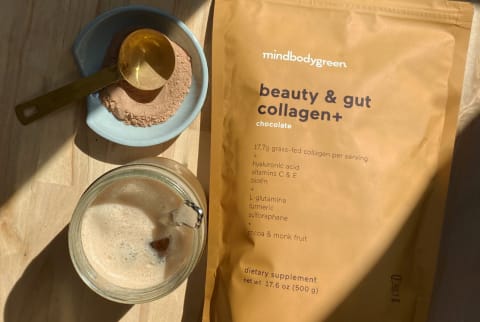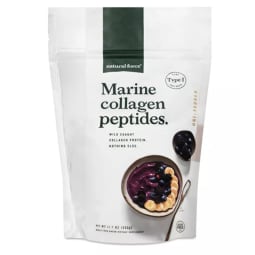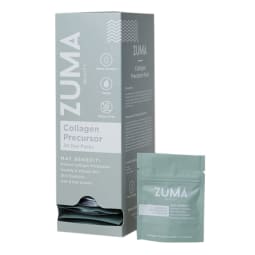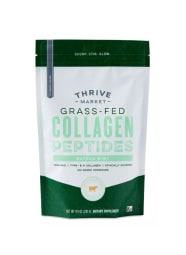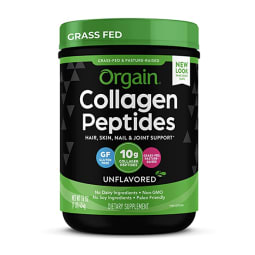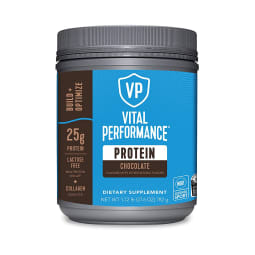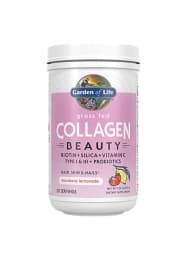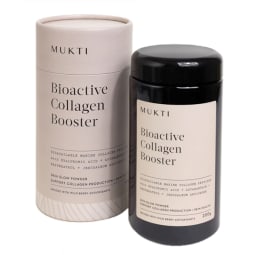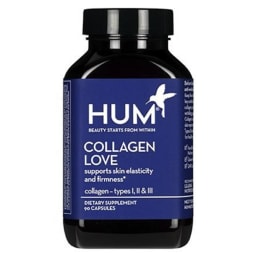Research shows that results are promising for the short and long-term use of oral collagen supplements for skin aging1 (think: skin hydration and elasticity), gut health, joint function2, and a variety of other full-body benefits.* 3 Thankfully, there is a flood of collagen supplements on the market. And with so many options available, you may be struck with a bout of decision fatigue—or be tempted to grab whatever reasonable-looking jar you find at your local health shop. But not so fast: There is actually a method for determining your best collagen fit, and it comes down to your goals and needs. See, collagen formulas vary quite a bit—be it due to collagen type or additional ingredients—and these factors play a role in how effective it will be toward an intended outcome. Read on for our best bets. Source: Bovine The one-step beauty routine for youthful skin, healthy hair & strong nails.* The innovative blend is rooted in its high-potency collagen foundation, delivering 17.7 grams of pasture-raised, grass-fed bovine collagen peptides (delivering types I and III collagen) but then it layers in several targeted ingredients, both nutrients and botanical bioactives, for holistic inside-out support.* There are vitamins C and E for enhanced collagen production and antioxidant support, hyaluronic acid for skin hydration, the protein building block L-glutamine, biotin for your beauty needs, and curcumin from turmeric extract and sulforaphane from broccoli seed extract for supporting detoxification and combating oxidative stress and photoaging.* Last but definitely not least: This collagen product is free of GMOs, dairy, soy, and gluten and clearly breaks down the amino acid profile on its label. Did we mention it comes in unflavored and chocolate varieties? Plus, new customers save 10% on their first order with promo code MBG10. While bovine collagen peptides tend to be the most effective, if you generally follow a pescatarian diet, marine collagen will be just right for you. Always look for peptides sourced from wild-caught sources, like this one, which comes from sustainably sourced cod and nothing else (there’s more on sourcing parameters below). We also like how transparent this brand is: They break down the amino acid profile, are third-party tested, and a Certified B Corp. As far as taste varieties go, chocolate and unflavored reign supreme. That’s why we were pleasantly surprised by this refreshing matcha mint option. The base is 10 grams of pasture-raised, ethically sourced bovine collagen (they, too, list the amino acid profile), and the sweetener used is extracted from monk fruit. And thanks to the matcha, it even contains six milligrams of caffeine per serving for a little morning boost.* If you’re looking for a less expensive option, this Orgain powder packs 20 grams of bovine sourced collagen peptides per serving for a more affordable price. (Also of note: You’re just getting collagen in this—no additional ingredients to support your health.) If you don’t like the unflavored variety, that can be remedied by mixing it into a flavored beverage of choice. Source: Bovine This is a good blend for athletes: The whey and collagen combo bumps the protein up to 25 grams (so about 10 grams of collagen and 15 grams of whey protein). Both whey and collagen contribute key amino acids critical for muscle mass, but whey has all nine of the essential amino acids, while collagen is missing one (making it incomplete by definition).* Just make sure you (and your skin) can tolerate whey. While the base contains a decent dose of types I and III collagen (12 grams of protein), the stars for the hair are biotin, silica, and vitamin C. Biotin is a main component of keratin production, or the primary protein of hair. (In one small study, women with thinning hair reported significant regrowth when supplementing with biotin as compared to those given a placebo.) It’s then layered with vitamin C to help neutralize free radicals (which can lead to aging hair) and silica (which may help strengthen hair and minimize thinning). This blend uses three grams of marine collagen, which is on the light end, but is bolstered with additional actives to support your skin.* There’s hyaluronic acid and aloe vera for hydration, astaxanthin for photodamage protection, and a proprietary super wild berry antioxidant complex to help with oxidative stress.* While we believe that powder is the best way to ingest a meaningful amount of collagen, some people love the ease of a capsule. If that’s you, go for this blend of bovine collagen (600 milligrams), vitamin C, hyaluronic acid, chondroitin, and phytonutrient antioxidants from red wine and grapeseed extracts. If you’re physically active, your needs may be higher. Collagen is a protein made of peptides, but it’s not a complete protein—it doesn’t have all nine of the essential amino acids (it’s missing tryptophan and is on the lower side on a few others)—but can absolutely contribute to your overall daily protein goals and needs.* For a collagen supplement, we recommend looking in the 10- to 20-gram range (per serving). Look for keywords like “grass-fed, pasture-raised bovine collagen from Brazilian cows,” or “sustainably-sourced, wild-caught cod.” Ideally, they’ll note what collagen types are provided (e.g., types I, II, or III) as well. Bonus points if they list the amino acid profile. If your diet allows, we prefer grass-fed bovine collagen, which you can learn more about here. Powders are also a convenient way to add a meaningful dose of collagen to your nutrition routine, whether blending into a sweet smoothie with colorful fruits or mixed into your morning coffee or latte. If you prefer other delivery methods—drinks, tonics, capsules, gummies—that’s fine; just know that you’re not getting as much collagen in these products. Look for research backing up why the ingredients were added and thoughtful explanations of the overall formulas. On the other end, make sure the formula is clean. Less is more here: Skip artificial colors, flavors, sweeteners, gluten, GMOs, soy, gluten, and known allergens. If your collagen product has flavors, look for natural varieties (such as organic cocoa, organic vanilla). If there’s a sweetener, we recommend natural plant-derived sources like organic monk fruit extract or organic coconut sugar. The type and source of collagen should be apparent. If they make any benefit claims, there should be science to support them. They should be open about where the ingredients come from, and they should explain the packaging it comes in (i.e., is it environmentally friendly?). RELATED: The 7 Best Collagen Powders + Dosage, Formats & More Once you narrow down the why, then you can start looking into the what. But we went ahead and made the latter part easy for you—these 16 options are the best out there. RELATED: Does Collagen Work? How To Make Sure Your Supplement Does*



